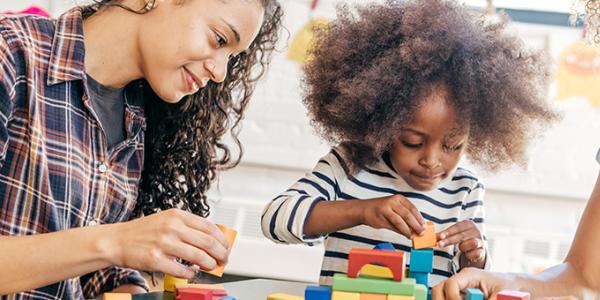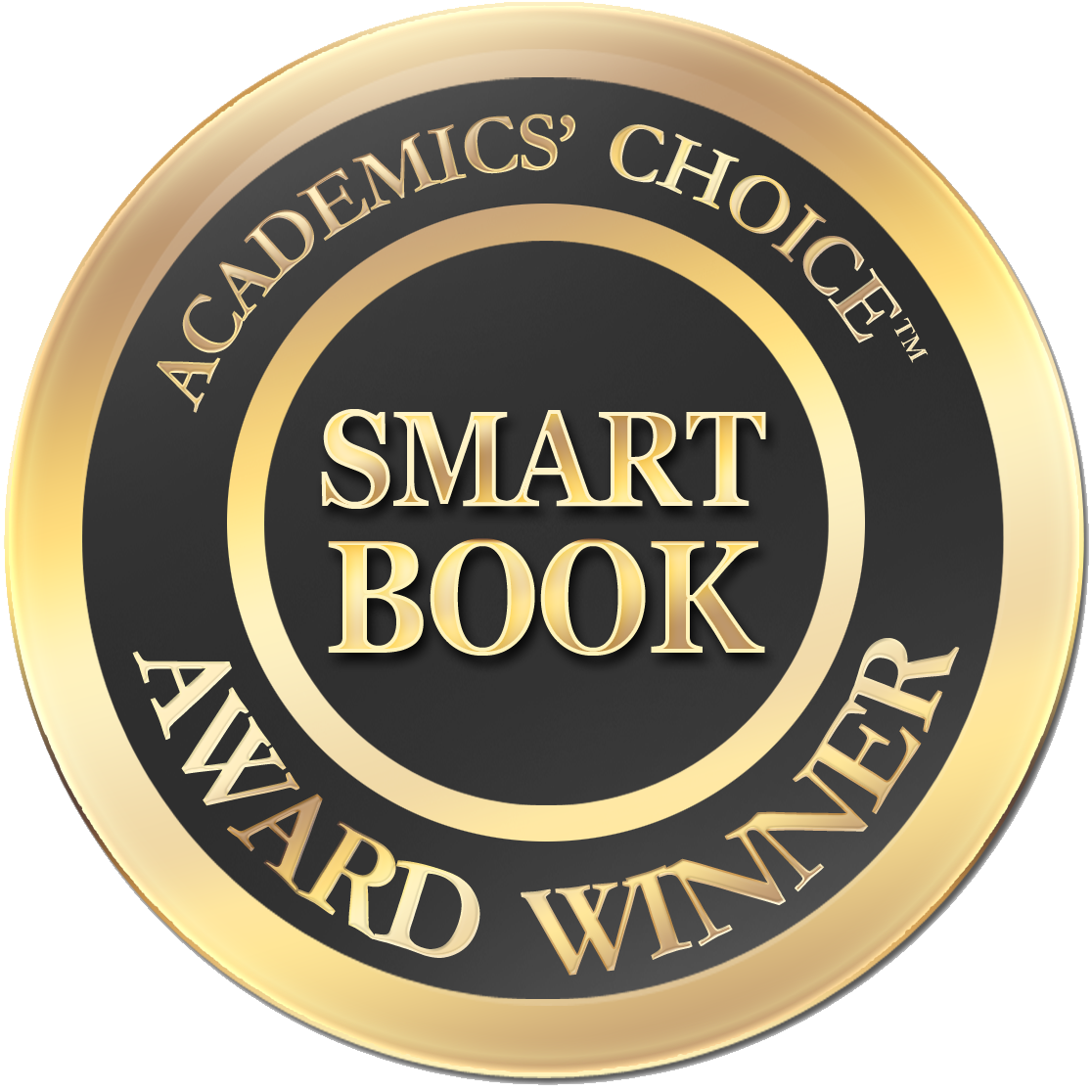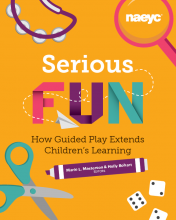Serious Fun: How Guided Play Extends Children's Learning

About the Book
Guided play is a powerful tool educators can use to help preschoolers and kindergartners learn essential knowledge and skills in the context of playful situations. Apply the information, strategies, and ideas in this book to
- Provide content-rich, joyful learning experiences
- Balance child-guided and adult-guided play
- Set up play environments with learning goals in mind
- Offer suggestions and questions during play to prompt children’s reflection and deeper learning
Young children’s natural curiosity and dynamic imaginations can lead to exciting and meaningful learning opportunities. Discover how to provide guided play experiences along with opportunities for unstructured play to support children’s knowledge in key areas and their lifelong enjoyment and pursuit of learning.
E-book versions of this publication are available in Spanish, Arabic, and Mandarin.

Table of Contents
This section includes links to full chapters from inside the book (PDF).
-
Introduction
Marie L. Masterson and Holly Bohart -
Part One: Intentionally Creating Play Environments for Learning
-
Chapter 1: Brain Science and Guided Play
Brenna Hassinger-Das, Kathy Hirsh-Pasek, and Roberta Michnik Golinkoff -
Chapter 2: Observing, Planning, Guiding: How an Intentional teacher Meets Standards Through Play
Patricia McDonald
-
Chapter 1: Brain Science and Guided Play
-
Part Two: Providing Rich Content Experiences Through Play
-
Chapter 3: Supporting Language Through Culturally Rich Dramatic Play
Irasema Salínas-Gonzalez, María G. Arreguin-Anderson, and Iliana Alanís -
Chapter 4: Connecting Art, Literacy, and Drama Through Storytelling
Bonnie Ripstein -
Chapter 5: Playful Math Instruction and Standards
Deborah Stipek -
Chapter 6: Fostering Positive Experiences in the Math Center for African-American Boys
Danielle B. Davis and Dale C. Farran -
Chapter 7: What Can You Do With Bamboo? Preschoolers Explore a Natural Material
Condie Collins Ward -
Chapter 8: Engaging and Enriching Play is Rigorous Learning
Shannon Riley-Ayers and Alexandra Figueras-Daniel
-
Chapter 3: Supporting Language Through Culturally Rich Dramatic Play
-
Reflection
Marie L. Masterson -
For Families: Play and Learning Go Hand in Hand
Laurel Bongiorno - References
- Resources for Further Learning
- About the Authors and Editors
Book Details
ISBN: 978-1-938113-39-0
Publish Date: 2019
Related Resources
Online Training
This self-paced online module for preschool teachers focuses on planning, implementing, and observing playful activities that enhance children’s knowledge and skills. Register today!
Study Guide
Download the study guide for additional strategies on how to implement, observe, and assess playful learning in the classroom.
Webinar
The powerful impact of play-based learning - In this webinar, Psychology expert Kathy Hirsh-Pasek and policy analyst Shayna Cook, dig into the latest research on why play is critical to children’s learning and development. This video will help educators learn strategies to gently guide play in ways that boost knowledge and skill development. Administrators and policy makers will discover why recent brain research supports increased time for play-based learning.
Online Articles
The Case of Brain Science and Guided Play: A Developing Story - This article examines the relationships between children’s play and development. (Young Children, May 2017)
Playful Math Instruction in the Context of Standards and Accountability - Did the children in this article know they were participating in math lessons? Probably not. But they were indeed learning math through what we refer to as playful instruction. (Young Children, July 2017)
Observing, Planning, Guiding: How an Intentional Teacher Meets Standards through Play - This article describes achieving a balance of child-directed and teacher-guided play in the classroom. (Young Children, March 2018)
Looking for more resources on Play? Visit our topic page to browse our collection of articles on the topic.
Enrich Your Curriculum: Purchase the Module!
The Serious Fun! online module is self-paced and designed for preschool educators looking to enhance their knowledge of guided play in the classroom. This module for preschool teachers focuses on planning, implementing, and observing playful activities that enhance children’s knowledge and skills. This online learning experience offers guidance on how to interact with children during play, carefully evaluate teaching practices, incorporate meaningful play opportunities into rigorous and developmentally appropriate practices that can result in deep, rich learning for children, and more.
This course is available in English and Spanish:
Resources
Recommendations
For Authors & Photographers
Catalog
Webinars
NAEYC Books List
Services
Shop
Marie Masterson, PhD, is the director of quality assessment at the McCormick Center for Early Childhood Leadership at National Louis University, where she oversees evaluation for ExceleRate Illinois. She holds a doctorate in early childhood education, is a licensed teacher, and is a national speaker and author of many books and articles that address research-based, practical skills for high-quality teaching, behavior guidance, quality improvement, and leadership. She is a contributing editor of Developmentally Appropriate Practice in Early Childhood Programs Serving Children from Birth Through Age 8, fourth edition, and coauthor of
Building on Whole Leadership: Energizing and Strengthening Your Early Childhood Program. Dr. Masterson is a former higher education faculty teacher trainer and early childhood specialist for the Virginia Department of Education. She provides educational consulting and professional development training to child care programs, schools, and organizations engaged in quality improvement and equitable teaching initiatives.

Holly Bohart is senior editor in Books and Related Resources at NAEYC. She formerly taught in special education early childhood programs.
Reviews
[Serious Fun: How Guided Play Extends Children’s Learning] offers richly informative and timely coverage of a paradigm that perhaps can stop, once and for all, the cycle of alternating between overly didactic instruction and overly permissive free play. The book provides many opportunities to consider important basic questions about the adult’s role in children’s play and the relationship between teaching, playing, and learning. Play is valuable, certainly, even when it does not contribute to the curriculum and even if teachers are not involved. Nevertheless, this book draws attention to the role of teachers (or parents) in providing background experiences, making play provisions, and implementing interactional strategies; in other words, guiding the play of young children.
—Excerpt from Teachers College Record review by James Johnson
